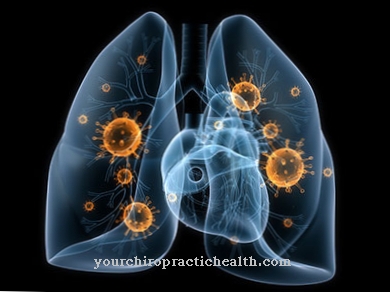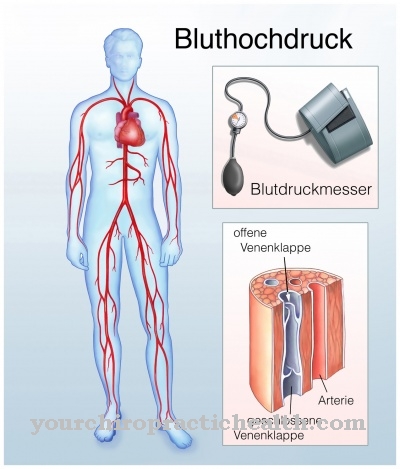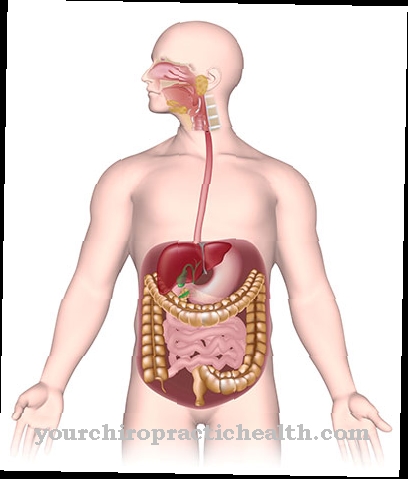A Methanol poisoning is an intoxication with methyl alcohol (methanol), the metabolic products of which have a harmful effect on the human organism. Depending on body weight and general condition, less than 30 ml can be lethal.
What is methanol poisoning?

© tonda55 - stock.adobe.com
As Methanol poisoning describes excessive exposure of the human organism to the toxic methyl alcohol (methanol intoxication). In general, a distinction is made between acute and chronic methanol poisoning.
Acute intoxication with methanol is characterized by a single ingestion of a large amount of methanol. If the alcohol is absorbed into the gastrointestinal tract after about 12 to 24 hours, it manifests itself as nausea, vomiting, headache, impaired vision and dizziness. In more pronounced cases, convulsive jerks and impaired consciousness can be observed.
Acute methanol poisoning can lead to death due to the paralyzing effect on the circulatory and respiratory centers. In the case of chronic methanol poisoning, on the other hand, small amounts of methanol are inhaled or absorbed through the skin, which, if exposed over a longer period of time, lead to visual disturbances and damage to the visual and auditory nerves. Loss of appetite, abdominal pain, and recurrent irritation of the eye and airway mucous membranes are other characteristic symptoms of chronic methanol poisoning.
causes
At a Methanol poisoning After ingestion, the methanol is converted in the liver by the enzymes alcohol dehydrogenase and aldehyde dehydrogenase into its harmful metabolites (metabolites) formic acid and formaldehyde.
The metabolites are only slowly eliminated or excreted renally (via the kidneys), so that these two toxic substances are accumulated in the body. While formic acid causes metabolic acidosis with a metabolic derailment, formaldehyde has a direct damaging effect on the adjacent organs.
Methanol poisoning is mainly caused by the consumption of inferior or improperly self-distilled spirits, which may contain higher amounts of methanol.In addition, methanol is used in the commercial sector as a solvent for varnishes, adhesives and paints as well as in the pharmaceutical, chemical and cosmetic industries, which can cause chronic methanol poisoning if inhaled or absorbed through the skin for a long time.
Symptoms, ailments & signs
Methanol poisoning manifests itself in visual disturbances, nausea and vomiting, severe headache and dizziness. As a result of the over-acidification, disorders of consciousness can also occur. The strongly acidic urine has an unusual odor and often takes on a strong yellow color. In addition, methanol poisoning can impair hearing.
Those affected are then no longer able to perceive low tones correctly, and later the high tones are no longer perceived. The liver is also often involved and there are signs of jaundice, i.e. yellow skin, paleness and severe malaise. Externally, symptoms such as acidosis can be seen as blue lips and pale skin. The strong bad breath and accelerated breathing are also typical.
In the long term, methanol poisoning causes vision problems, hearing problems, atherosclerosis, arthritis, osteoporosis, heart failure and diseases of the immune system. The chronic form of the disease develops over the course of months or years, during which inferior spirits or other products containing methanol are consumed again and again. Acute methanol poisoning occurs within a few hours of alcohol consumption and paralyzes the cardiovascular system and breathing. The acute form can lead to death of the patient if left untreated.
Diagnosis & course
A Methanol poisoning can in many cases be diagnosed on the basis of clinical symptoms and the information gained in the anamnesis about possible exposure to methanol (work with solvents, consumption of inferior spirits).
In addition, in acute methanol poisoning, an enlarged liver, oliguria or anuria, in pronounced cases uremia with residual nitrogen and an increase in blood pressure can be detected. In addition, the urine in the acidic range and a very high concentration of calcium oxalate crystals with a very low erythrocyte and leukocyte count can be determined. Metabolic acidosis can be diagnosed as part of a blood gas analysis (including reduced carbon dioxide partial pressure).
In chronic methanol poisoning, the methanol can be detected in the urine and blood. In addition, an increased formic acid concentration in the urine can usually be found. The course and prognosis of methanol poisoning correlate with the time of diagnosis and the start of therapy. The later an intoxication with methanol is recognized, the more likely irreversible damage is. If left untreated, methanol poisoning is fatal on all shelves. Long-term effects, in particular loss of vision, can also be observed in the case of methanol poisoning.
Complications
In general, methanol poisoning has a very negative effect on the health of the patient and in the worst case can even lead to the death of the person concerned. However, this only occurs when larger amounts of methanol have been introduced into the body. However, even small amounts can cause severe damage, which can mainly affect the internal organs and the brain.
The damage is usually irreversible. As a result of methanol poisoning, those affected suffer from severe visual disturbances and, in many cases, blurred vision. There is also vomiting and severe nausea. Patients also complain of dizziness and headaches, and also suffer from impaired consciousness. The thoughts and actions of those affected are also significantly restricted by the methanol poisoning.
As a rule, methanol poisoning requires acute treatment by an emergency doctor or in a hospital. Consequential damage can be avoided with gastric lavage. Complications usually only arise with higher amounts, which can lead to damage to the internal organs. The exact course of the disease depends very much on the amount of methanol ingested.
When should you go to the doctor?
People who experience sudden symptoms such as vomiting, nausea, dizziness, or headache should see a doctor. If the usual eyesight is impaired or the general risk of accidents increases, a medical examination is required. If the symptoms increase in scope or intensity, a doctor must be consulted. Disturbances in consciousness are signs of an existing irregularity that needs to be investigated and treated. If there is a loss of consciousness, an ambulance service must be alerted. Until the emergency doctor arrives, first aid measures must be taken so that the person concerned does not die prematurely.
A pale or yellowish complexion, cold limbs or discoloration of the lips are further indications of a health problem. A blue discoloration of the lips is a characteristic of methanol poisoning and should be treated as soon as possible. If hearing loss occurs, there is cause for concern. If the person concerned can no longer hear low tones in particular, it is advisable to see a doctor.
If you feel generally unwell or have an unusual bad breath, a doctor should clarify the symptoms. If the person concerned suffers from a weakened immune system, a decrease in internal strength or from insomnia, a doctor is needed. If heart rhythm irregularities occur, further medical tests should be carried out immediately to clarify the cause.
Treatment & Therapy
Since methanol is only metabolized slowly, a Methanol poisoning gastric lavage is usually performed first. Another therapeutic measure consists in the inhibition of methanol oxidation by orally administered or infused ethanol or fomepizole.
Both substances have a much higher affinity for aldehyde dehydrogenase and alcohol dehydrogenase, so that the metabolism of methanol in the liver can be effectively suppressed until renal elimination. In addition, alkalizing substances such as sodium hydrogen carbonate and trometamol are administered in parallel to compensate for metabolic acidosis (pH value in arterial blood is acidic or below 7.35). As a result of the extra- and intracellular pH value normalized as a result, the breakdown of formic acid is accelerated (increased degree of dissociation), which can reduce the toxic effect.
In addition, the damaging effects of formic acid can be accelerated by high-dose folic acid, which promotes the oxidation of the substance to carbon dioxide. In severe cases of methanol poisoning (over 100 ml ingestion) or in the presence of renal insufficiency, hemodialysis (kidney replacement method) is required to quickly eliminate the methanol and its metabolic products.
In the case of chronic methanol poisoning, it is usually recommended to stop exposure (avoid all sources of methanol) and change your diet (vitamin and protein-rich food, increased fluid intake). In addition, the organ damage caused by the methanol poisoning should be treated.
Outlook & forecast
The further development of health in the case of methanol poisoning depends on the amount of high-percentage alcohol consumed, the weight of the person affected and their general condition. The higher the absorbed value of methyl alcohol, the less favorable the further course. Under optimal conditions, the symptoms will be alleviated within a few hours.
Symptoms are usually free of symptoms within one to two days. The prerequisite for this is a good health condition of the person concerned and a weight in the normal range of the BMI. In addition, there should be a good and balanced lifestyle in order to achieve lasting relief from the symptoms.
However, if the amount of methyl alcohol consumed is high, there is a fundamental danger to life. In addition, irreparable damage to the internal organs can occur and cause lifelong impairment. If you are in poor health and have previous illnesses, the further course is usually unfavorable. If the person is already suffering from alcohol, consequential damage can hardly be ruled out.
Normally, the lower the patient's weight, the greater the further complications and long-term health impairments. In acute cases, only an ambulance service and intensive medical care can save the life of the person concerned. In these situations, damage to the brain can be expected. These worsen the general quality of life.
prevention
One Methanol poisoning can be prevented by avoiding high-proof spirits of unknown origin or of poor quality. For occupational activities that involve exposure to methanol, the appropriate protective measures (including protective gloves, clothing, eye and face protection, well-ventilated rooms) should be taken to prevent methanol poisoning.
Aftercare
Since methanol poisoning is a serious form of poisoning, adequate follow-up care is extremely important. In order to rebuild the affected intestinal flora, the patients can, for example, take a cure with lactic acid bacteria. It is generally recommended to revitalize the stomach for a while after the acute phase with gentle food.
Since the immune system is damaged by food poisoning, the susceptibility to germs is increased. The focus should therefore be on carefully getting used to food and on medical observation by the attending physician. It is the responsibility of those affected to stay away from substances containing menthanol.
You can do that yourself
In the case of slight methanol poisoning, the person affected should drink sufficient amounts of carbonated and natural mineral water. The supply of water reduces the percentage of methanol in the organism, as it mixes with the water. The total amount of fluids also means that it is excreted more quickly. This improves physical wellbeing in some cases.
Calm should be maintained and overexertion should be avoided. In order to keep the risk of injury as low as possible, it is helpful if the person concerned goes into a sitting position and pays attention to the changes in the organism. If his condition gradually improves, there is a good chance that he will be symptom-free in some time. If the symptoms increase, a doctor should be called because the self-help options are exhausted.
In the case of severe poisoning, only medical treatment will help. There is a possibility that organs are damaged and permanent damage occurs. The longer a consultation with a doctor is avoided, the more severe the symptoms. During an ongoing treatment, individual possibilities for self-help can be worked out in cooperation with the doctor. These focus on optimizing a healthy lifestyle. This includes a balanced diet rich in vitamins and adequate exercise. Toxins like alcohol or nicotine should be avoided.













.jpg)

.jpg)
.jpg)











.jpg)